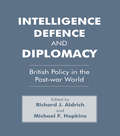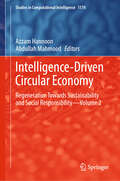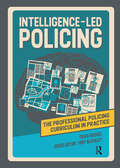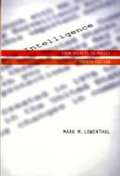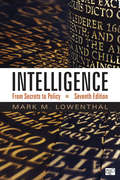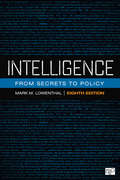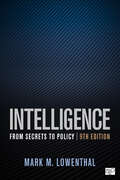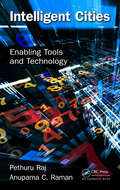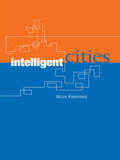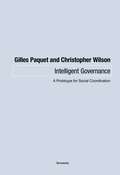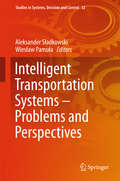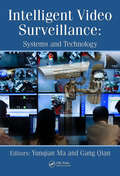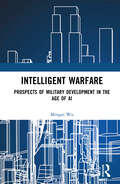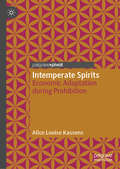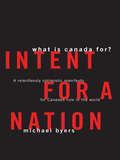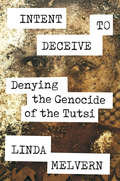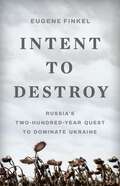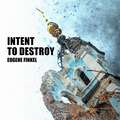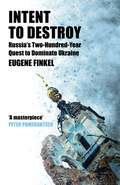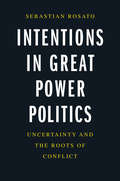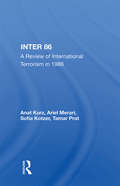- Table View
- List View
Intelligence, Defence and Diplomacy: British Policy in the Post-War World (Studies in Intelligence)
by Richard J. Aldrich Michael F. HopkinsWhat was Britain's reaction to the death of Stalin? How has Britain reconciled a modern nuclear strategy with its traditional imperial defence commitments around the world? How has secret intelligence affected the Special Relationship' since 1945? Certain clear questions and perennial themes run through British overseas policy since 1945. This book examines them, drawing on new research by leading historians and scholars in the field.
Intelligence-Driven Circular Economy: Regeneration Towards Sustainability and Social Responsibility—Volume 2 (Studies in Computational Intelligence #1174)
by Azzam Hannoon Abdullah MahmoodThis book provides a platform for scholars and researchers to present the latest insights and findings on the role of artificial intelligence and smart digital solutions in fostering the circular economy. Additionally, the book shades the lights on the vital role of circular economy in achieving sustainability and social responsibility. It covers a variety of research topics including circular economy, sustainability, AI applications, legislation and regulation, smart cities, social entrepreneurship and AI, digital transformation, knowledge management, and cybersecurity. This edited book serves as a reference and guide to graduate students, researchers, and academics conducting research and taking courses in artificial intelligence, sustainability, and the circular economy.
Intelligence-led Policing (The Professional Policing Curriculum in Practice)
by Craig HughesIntelligence-led Policing clearly explains the distinction between information and intelligence, and discusses how to gather, analyse and utilise intelligence to inform decision making in practice. It relates all areas of intelligence within the investigative process and contextualises its use in line with the National Intelligence Model (NIM) as part of routine working practice. It develops a knowledge base by identifying six tiers of policing intelligence architecture, exploring the concept of intelligence as it applies to strategic, tactical and practice levels of operational policing. A great mix of theory and practice to help students explore how information can become useful intelligence including the process through which it goes and the importance of intervention points.The Professional Policing Curriculum in Practice is a new series of books that match the requirements of the new pre-join policing qualifications. The texts reflect modern policing, are up-to-date and relevant, and grounded in practice. They reflect the challenges faced by new students, linking theory to real-life operational practice, while addressing critical thinking and other academic skills needed for degree-level study.
Intelligence: From Secrets to Policy
by Mark M. LowenthalThis book is intended to provide an understanding of the role of intelligence in creating national security policy and the strengths and weaknesses of the intelligence community. The primary theme of this book, now in its fourth edition, is that intelligence is subservient to policy and that it is most analytically and operationally effective when it works within distinct policy goals. Topics include the development of U.S. intelligence and the U.S. intelligence community, counterintelligence and covert action, oversight and accountability, intelligence reform, and ethical, moral, and transnational issues. Author Lowenthal is a former intelligence official and currently an educator and CEO of a national security training, education, and consulting company. Annotation ©2009 Book News, Inc., Portland, OR (booknews.com)
Intelligence: From Secrets to Policy
by Mark M. LowenthalMark M. Lowenthal’s trusted guide is the go-to resource for understanding how the intelligence community’s history, structure, procedures, and functions affect policy decisions. In this Seventh Edition, Lowenthal examines cyber space and the issues it presents to the intelligence community such as defining cyber as a new collection discipline; the implications of the Senate Intelligence Committee’s staff report on enhanced interrogation techniques; the rise of the Islamic State; and the issues surrounding the nuclear agreement with Iran. New sections have been added offering a brief summary of the major laws governing U.S. intelligence today such as domestic intelligence collection, whistleblowers vs. leakers, and the growing field of financial intelligence.
Intelligence: From Secrets to Policy
by Mark M. LowenthalMark M. Lowenthal’s trusted guide is the go-to resource for understanding how the intelligence community’s history, structure, procedures, and functions affect policy decisions. In this Seventh Edition, Lowenthal examines cyber space and the issues it presents to the intelligence community such as defining cyber as a new collection discipline; the implications of the Senate Intelligence Committee’s staff report on enhanced interrogation techniques; the rise of the Islamic State; and the issues surrounding the nuclear agreement with Iran. New sections have been added offering a brief summary of the major laws governing U.S. intelligence today such as domestic intelligence collection, whistleblowers vs. leakers, and the growing field of financial intelligence.
Intelligence: From Secrets to Policy
by Mark M. LowenthalMark M. Lowenthal’s trusted guide is the go-to resource for understanding how the intelligence community’s history, structure, procedures, and functions affect policy decisions. In the fully updated Eighth Edition of Intelligence, the author addresses cyber security and cyber intelligence throughout, expands the coverage of collection, comprehensively updates the chapters on nation-state issues and transnational issues, and looks at foreign intelligence services, both large and small.
Intelligence: From Secrets to Policy
by Mark M. LowenthalMark M. Lowenthal’s trusted guide is the go-to resource for understanding how the intelligence community’s history, structure, procedures, and functions affect policy decisions. In the fully updated Eighth Edition of Intelligence, the author addresses cyber security and cyber intelligence throughout, expands the coverage of collection, comprehensively updates the chapters on nation-state issues and transnational issues, and looks at foreign intelligence services, both large and small.
Intelligence: From Secrets to Policy
by Mark M. LowenthalMark M. Lowenthal’s trusted guide is the go-to resource for understanding how the intelligence community’s history, structure, procedures, and functions affect policy decisions. In the fully updated Ninth Edition of Intelligence, the author addresses cyber security and cyber intelligence throughout, expands the coverage of collection, comprehensively updates the chapters on nation-state issues and transnational issues, and looks at foreign intelligence services, both large and small.
Intelligence: From Secrets to Policy
by Mark M. LowenthalMark M. Lowenthal’s trusted guide is the go-to resource for understanding how the intelligence community’s history, structure, procedures, and functions affect policy decisions. In the fully updated Ninth Edition of Intelligence, the author addresses cyber security and cyber intelligence throughout, expands the coverage of collection, comprehensively updates the chapters on nation-state issues and transnational issues, and looks at foreign intelligence services, both large and small.
Intelligent Cities: Enabling Tools and Technology
by Pethuru Raj Anupama C. RamanThe emergence of highly promising and potent technologies has enabled the transition of ordinary objects into smart artifacts-providing wider connectivity of digitized entities that can facilitate the building of connected cities. This book provides readers with a solid foundation on the latest technologies and tools required to develop and enhance smart cities around the world. The book begins by examining the rise of the cloud as the fundamental technology for establishing and sustaining smart cities and enterprises. Explaining the principal technologies and platform solutions for implementing intelligent cities, the book details the role of various technologies, standards, protocols, and tools in establishing flexible homes and the buildings of the future. Examines IT platforms and tools from various product vendors Considers service-oriented architecture and event-driven architecture for smart city applications Explains how to leverage big data analytics for smart city enhancement and improved decision making Includes case studies of intelligent cities, smart homes, buildings, transports, healthcare systems, and airports The authors explore the convergence of cloud computing and enterprise architecture and present valuable information on next-generation cloud computing. They also cover the various architectural types, including enterprise-scale integration, security, management, and governance. The book concludes by explaining the various security requirements of intelligent cities as well as the threats and vulnerabilities of the various components that form the basis of the intelligent city framework, including cloud, big data, Internet of Things, and mobile technologies.
Intelligent Cities: Innovation, Knowledge Systems and Digital Spaces (Regions And Cities Ser.)
by Nicos KomninosAt the turn of the century some cities and regions in Europe, Japan and the USA, displayed an exceptional capacity to incubate and develop new knowledge and innovations. The favourable environment for research, technology and innovation created in these areas was not immediately obvious, yet it was of great significance for a development based on knowledge, learning, and innovation. Intelligent Cities focuses on these environments of innovation, and the major models (technopoles, innovating regions, intelligent cities) for creating an environment-supporting technology, innovation, learning, and knowledge-based development.The introduction and the first chapter deal with innovation as an environmental condition, and with the geography and typology of islands of innovation. The next three parts focus on the theoretical paradigms and the planning models of the 'industrial district', the innovating region', and the 'intelligent city', which offer three alternative ways to create an environment of innovation.
Intelligent Governance: A Prototype for Social Coordination
by Christopher Wilson PaquetStriking the right fit between resources, processes, and outcomes in complex environments, where different groups have something to contribute towards joint outcomes, even though they partake in joint operations in the pursuit of their own objectives This is what intelligent governance is all about. It is the practical application of an evolving worldview that is a less conflictive, more intelligent, more cooperative and a wiser mode of human coordination. This short book proposes some guideposts for intelligent governance. It does not put forward a rigid blueprint or a recipe that could mechanically and blindly be followed, but a prototype for a process of inquiry seeking to help organizations find a way forward (through innovation and value adding), some general indications about the most toxic pitfalls likely to materialize mental prisons, lack of mindfulness, etc. and comments about the most promising opportunities or initiatives likely to nudge the coordinating inquiries into successful directions.
Intelligent Transportation Systems - Problems and Perspectives
by Aleksander Sładkowski Wiesław PamułaThis book presents a discussion of problems encountered in the deployment of Intelligent Transport Systems (ITS). It puts emphasis on the early tasks of designing and proofing the concept of integration of technologies in Intelligent Transport Systems. In its first part the book concentrates on the design problems of urban ITS. The second part of the book features case studies representative for the different modes of transport. These are freight transport, rail transport and aerospace transport encompassing also space stations. The book provides ideas for deployment which may be developed by scientists and engineers engaged in the design of Intelligent Transport Systems. It can also be used in the training of specialists, students and post-graduate students in universities and transport high schools.
Intelligent Video Surveillance: Systems and Technology
by Yunqian Ma Gang QianFrom the streets of London to subway stations in New York City, hundreds of thousands of surveillance cameras ubiquitously collect hundreds of thousands of videos, often running 24/7. How can such vast volumes of video data be stored, analyzed, indexed, and searched? How can advanced video analysis and systems autonomously recognize people and
Intelligent Warfare: Prospects of Military Development in the Age of AI
by Mingxi WuThis book examines the future trend toward "intelligent" warfare considering the global environment, the history of warfare, and scientific and technological advancement. It develops a comprehensive set of theoretical frameworks, application concepts, and evaluation criteria for military intelligence.The volume is packed with theoretical highlights and vivid examples, including the tracking of Osama bin Laden, the decapitation strike against Qasem Soleimani, the remote assassination of Iranian nuclear scientists, the drone war in the Nagorno–Karabakh conflict, modern equipment deployed in the Palestinian–Israeli conflict, and the war between social media groups. In addition, the author envisions a possible future for "intelligent" wars in which adversarial parties engage in combat through virtual and unmanned systems. This nature may help avoid the brutality and high death toll associated with traditional warfare.The book explores the possibility of future civilized warfare. It will be of interest to researchers, academics, and students in the fields of politics, military intelligence, and military technology, and to those who are interested in intelligent warfare in general.
Intemperate Spirits: Economic Adaptation during Prohibition
by Alice Louise KassensUsing the basic economic principle of making decisions using a cost-benefit framework—and how changes in one or the other can result in a different decision—this book uncovers how various groups responded to incentives provided by the Prohibition legislation. Using this calculus, it is clear that even criminals are rational characters, responding to incentives and opportunities provided by the 18th Amendment and the Volstead Act. The book begins with a broad look at the adaptations of the law’s targets: the wine, beer, and liquor industries. It then turns to specific people (Violators, Line Tip-Toers, Enablers, and Hypocrites), sharing their stories of economic adaptation to bring economic lessons to life. Due to its structure, the book can be read in parts or as a whole and is suitable for short classroom reading assignments or individual pleasure reading.
Intent For A Nation: What is Canada For
by Michael ByersIn Intent for a Nation, Michael Byers argues that it is time for a clear-eyed appreciation of our strengths and weaknesses, of all we have and all we could be. A whole series of world events-the waning of US credibility; the increasing value of natural resources; the brain-gain; the ever-increasing interdependence of peoples, countries and continents-have combined to put Canada center stage in a new world order. Instead of emulating our increasingly isolated neighbor, we should be advancing the Canadian model, an idealistic, fiscally prudent, socially progressive vision that has never looked so good.Intent for a Nation is a fundamentally optimistic, informed and opinionated overview of where Canada stands in the world and what aggressive public policies are needed to carry the country forward in an ever more competitive and volatile world.Here is a book urging Canadians to rediscover their national self-confidence, to find the courage to dream great dreams-and make them happen.
Intent to Deceive: Denying the Rwandan Genocide
by Linda MelvernA shocking exposé of genocide denialIt is twenty-five years since the 1994 genocide of the Tutsi of Rwanda when in the course of three terrible months more than 1 million people were murdered. In the intervening years a pernicious campaign has been waged by the perpetrators to deny this crime, with attempts to falsify history and blame the victims for their fate. Facts are reversed, fake news promulgated, and phoney science given credence. Intent to Deceive tells the story of this campaign of genocide denial from its origins with those who planned the massacres. With unprecedented access to government archives including in Rwanda Linda Melvern explains how, from the moment the killers seized the power of the state, they determined to distort reality of events. Disinformation was an integral part of their genocidal conspiracy. The génocidaires and their supporters continue to peddle falsehoods. These masters of deceit have found new and receptive audiences, have fooled gullible journalists and unwary academics. With their seemingly sound research methods, the Rwandan génocidaires continue to pose a threat, especially to those who might not be aware of the true nature of their crime. The book is a testament to the survivors who still live the horrors of the past. Denial causes them the gravest offence and ensures that the crime continues. This is a call for justice that remains perpetually delayed.
Intent to Destroy: Russia's Two-Hundred-Year Quest to Dominate Ukraine
by Eugene FinkelWritten with &“erudition and verve&” (Timothy Snyder, New York Times-bestselling author of On Tyranny), this is the full story of how and why Russia has tried to violently subjugate Ukraine across the centuries, and how Ukrainians have resisted Russia&’s brutal invasion of Ukraine in February 2022 shocked the world. And yet, to Ukrainians, this attack was painfully familiar, the latest episode in a centuries-long Russian campaign to divide and oppress Ukraine. In Intent to Destroy, political scientist Eugene Finkel uncovers these deep roots of the Russo-Ukrainian War. Ukraine is a key borderland between Russia and the West, and, following the rise of Russian nationalism in the nineteenth century, dominating Ukraine became the cornerstone of Russian policy. Russia has long used genocidal tactics—killings, deportations, starvation, and cultural destruction—to successfully crush Ukrainian efforts to chart an independent path. As Finkel shows, today&’s violence is simply a more extreme version of the Kremlin&’s long-standing policy. But unlike in the past, the people of Ukraine—motivated by the rise of democracy in their nation—have overcome their deep internal divisions. For the first time, they have united in favor of independence from Russia. Whatever the outcome of the present war, Ukraine&’s staunch resistance has permanently altered its relationship to Russia and the West. Intent to Destroy offers the vital context we need to truly understand Europe&’s bloodiest conflict since World War II.
Intent to Destroy: Russia's Two-Hundred-Year Quest to Dominate Ukraine
by Eugene Finkel'The must read masterpiece . . . utterly essential' PETER POMERANTSEV'With erudition and verve' TIMOTHY SNYDER'Powerful' SERHII PLOKHY'Masterful' BEN ANSELLA history of Russian violence waged against Ukraine across the centuries. Russia's brutal invasion of Ukraine in February 2022 shocked the world. And yet this attack was in fact the latest episode in a centuries-long Russian campaign. In Intent to Destroy, leading scholar of genocide and Eastern Europe Eugene Finkel uncovers the deep roots of the Russo-Ukrainian War. Ever since the rise of Russian nationalism in the nineteenth century, the domination of this key borderland has become a cornerstone of Russian and Soviet policy. Using genocidal tactics - killings, deportations, starvation and cultural destruction - against ethnic Ukrainians and minorities including Tatars, Jews and Poles, Russia's long-standing policy has aimed to obliterate Ukrainian identity. This eradication has consistently been a part of the Kremlin playbook and leads inexorably to the violence we see today. Told with the astonishing power of Finkel's connection to this living history, and the authority of two decades of research, Intent to Destroy casts today's war it its broadest historical context, illuminating as never before Europe's bloodiest conflict since World War II.
Intent to Destroy: Russia's Two-Hundred-Year Quest to Dominate Ukraine
by Eugene Finkel'The must read masterpiece . . . utterly essential' PETER POMERANTSEV'With erudition and verve' TIMOTHY SNYDER'Powerful' SERHII PLOKHY'Masterful' BEN ANSELLA history of Russian violence waged against Ukraine across the centuries. Russia's brutal invasion of Ukraine in February 2022 shocked the world. And yet this attack was in fact the latest episode in a centuries-long Russian campaign. In Intent to Destroy, leading scholar of genocide and Eastern Europe Eugene Finkel uncovers the deep roots of the Russo-Ukrainian War. Ever since the rise of Russian nationalism in the nineteenth century, the domination of this key borderland has become a cornerstone of Russian and Soviet policy. Using genocidal tactics - killings, deportations, starvation and cultural destruction - against ethnic Ukrainians and minorities including Tatars, Jews and Poles, Russia's long-standing policy has aimed to obliterate Ukrainian identity. This eradication has consistently been a part of the Kremlin playbook and leads inexorably to the violence we see today. Told with the astonishing power of Finkel's connection to this living history, and the authority of two decades of research, Intent to Destroy casts today's war it its broadest historical context, illuminating as never before Europe's bloodiest conflict since World War II.
Intent to Destroy: Russia's Two-Hundred-Year Quest to Dominate Ukraine
by Eugene Finkel'The must read masterpiece . . . utterly essential' PETER POMERANTSEV'With erudition and verve' TIMOTHY SNYDER'Powerful' SERHII PLOKHY'Masterful' BEN ANSELLA history of Russian violence waged against Ukraine across the centuries. Russia's brutal invasion of Ukraine in February 2022 shocked the world. And yet this attack was in fact the latest episode in a centuries-long Russian campaign. In Intent to Destroy, leading scholar of genocide and Eastern Europe Eugene Finkel uncovers the deep roots of the Russo-Ukrainian War. Ever since the rise of Russian nationalism in the nineteenth century, the domination of this key borderland has become a cornerstone of Russian and Soviet policy. Using genocidal tactics - killings, deportations, starvation and cultural destruction - against ethnic Ukrainians and minorities including Tatars, Jews and Poles, Russia's long-standing policy has aimed to obliterate Ukrainian identity. This eradication has consistently been a part of the Kremlin playbook and leads inexorably to the violence we see today. Told with the astonishing power of Finkel's connection to this living history, and the authority of two decades of research, Intent to Destroy casts today's war it its broadest historical context, illuminating as never before Europe's bloodiest conflict since World War II.
Intentions in Great Power Politics: Uncertainty and the Roots of Conflict
by Sebastian RosatoWhy the future of great power politics is likely to resemble its dismal past Can great powers be confident that their peers have benign intentions? States that trust each other can live at peace; those that mistrust each other are doomed to compete for arms and allies and may even go to war. Sebastian Rosato explains that states routinely lack the kind of information they need to be convinced that their rivals mean them no harm. Even in cases that supposedly involved mutual trust—Germany and Russia in the Bismarck era; Britain and the United States during the great rapprochement; France and Germany, and Japan and the United States in the early interwar period; and the Soviet Union and United States at the end of the Cold War—the protagonists mistrusted each other and struggled for advantage. Rosato argues that the ramifications of his argument for U.S.–China relations are profound: the future of great power politics is likely to resemble its dismal past.
Inter 86: A Review Of International Terrorism In 1986
by Anat KurzThis survey delineates various aspects of and major issues in international terrorism in 1986, focusing on western states' policies on terrorism and the use of and support for terrorism by Middle Eastern states. It also presents an analysis of trends in Palestinian terrorism.
